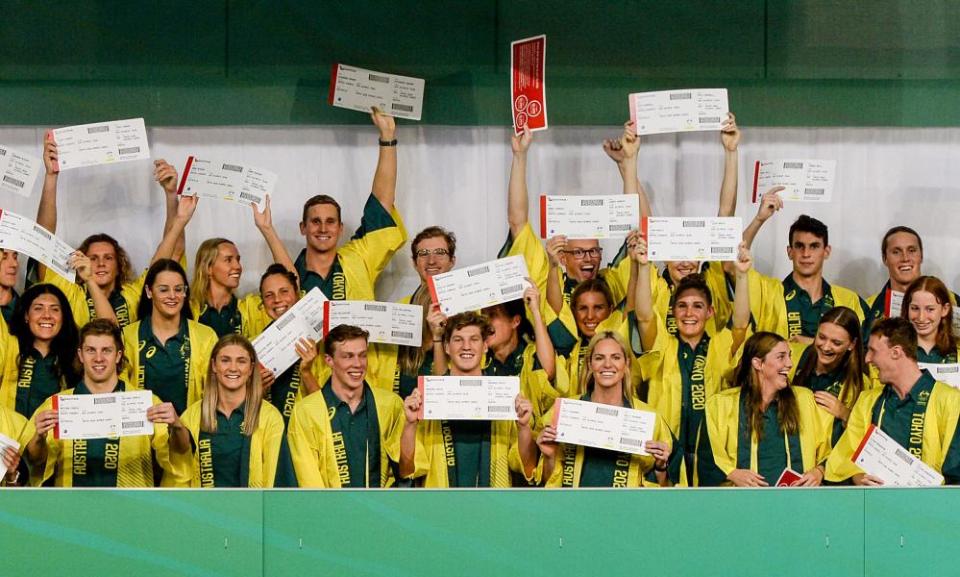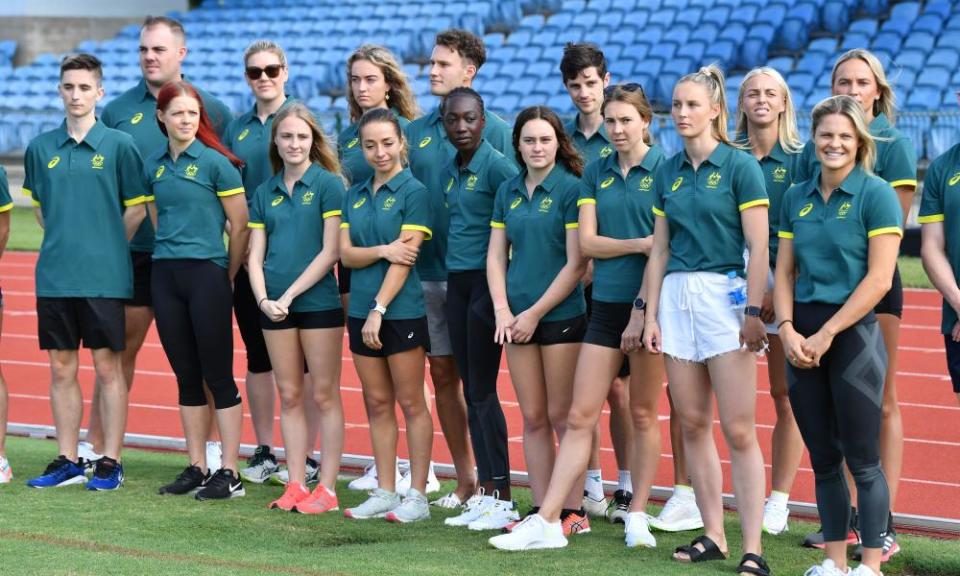Tokyo Olympics: if you’re watching from Australia, here’s what you need to know

When do the Games start?
The opening ceremony takes place next Friday, 23 July, which marks the official beginning of the Games, and the closing ceremony two weeks later on 8 August signals the end. Some competitions, such as football and softball, start two days before the opening ceremony. Even though the Covid-19 pandemic forced a one-year postponement, the Olympics are still referred to as “Tokyo 2020”, mainly because all the official branding had already been done.
How can I follow the Games?
The Guardian will be running a liveblog 24 hours a day, seven days a week for the duration of the Games, so you won’t miss out on a single medal won. It will first launch in the buildup to the opening ceremony and won’t close until after the closing ceremony, taking in the latest news, features and commentary from our team of reporters on the ground in Japan, and back on home soil, around the clock.
Otherwise, the Seven Network will broadcast the Games free to air, with coverage spread across its channels 7, 7TWO and 7Mate. Seven will also livestream every moment via 43 channels on the 7plus app and their website.
Related: Thomas Bach promises ‘safe and secure’ Olympics as Tokyo Covid cases soar
Will I have to stay up all night to watch?
Not this time. Australian Eastern Standard Time is only one hour ahead of Japan, which, if anything, means staying up an hour later than usual to catch the end of the evening events. Compared with the red-eye experience of Rio 2016 and London 2012, this is a proverbial breeze.

Why do some events start before the opening ceremony?
It is simply logistics. Some sports, particularly team sports featuring group stages, require longer than the traditional 16 days to complete the competition program. The medal matches in both the baseball/softball and the football, for instance, do not finish until 7 August. Archery, shooting, rowing, equestrian and artistic gymnastics also get going before the torch is lit.
Will all the events be held in Tokyo?
Tokyo is the host city, and most events will be staged in Japan’s capital, but several sports will be held elsewhere. Football matches will be played across six cities and baseball and softball in Yokohama and Fukushima. The marathons and race walking will be in the cooler northern city of Sapporo to avoid Tokyo’s stifling heat. The road and track cycling will be staged around Mount Fuji; surfing will make its Olympic debut at Tsurigasaki Beach, about 100km from Tokyo; the basketball will be played in Saitama; and the sailing will be held in Enoshima.
When is the first Australian in action?
The softball team kick off the green-and-gold campaign at 10am AEST on Wednesday 21 July with their opening-round game against host nation Japan. A few hours later, at 9.30pm AEST, the Matildas will play their first Group G football match against New Zealand.
Will Australia do well?
If the numbers are to be believed, very well indeed. In April, global data giant Gracenote predicted Australia would win a total of 40 medals including 12 gold, 13 silver and 15 bronze to finish overall seventh on the medal table. Canoe/kayak, road cycling, men’s hockey, rowing, sailing, swimming and triathlon are all in the mix, with the swimming contingent showing especially positive signs at the recent national trials in Adelaide. Gracenote’s final virtual medal table is due out next week.
Related: Olympics chief mixes up Japanese and Chinese at Tokyo Games presser
Who makes up the Australian squad?
All up, after 16 athletes were added this week, Australia’s delegation is 488 – more than in Athens 2004 and the biggest since 2000. Australia is also sending its largest contingent of Indigenous athletes, with 16 competing across 11 sports. They are Ash Barty (tennis), Angeline Blackburn (track and field), Taliqua Clancy (beach volleyball, Thomas Grice (shooting), Maurice Longbottom (rugby sevens), Patty Mills (basketball), Leilani Mitchell (basketball), Brooke Peris (hockey), Dylan Pietsch (rugby sevens), Stacey Porter (softball), Kyah Simon (football), Tarni Stepto (softball), Brandon Wakeling (weightlifting), Lydia Williams (football), Mariah Williams (hockey) and Alex Winwood (boxing).

Which new sports have been added?
Four new sports will make their bow: karate, skateboarding, sport climbing (aka rock climbing) and surfing. Karate features two disciplines in kata, a choreographed solo routine, and kumite, combat fights in weight classes. Skateboarding will include a street discipline involving ramps and rails, and a park discipline featuring a bowl. Climbing is broken down into three disciplines: lead climbing, bouldering and speed climbing. Surfing we know well – watch out for Stephanie Gilmore and Sally Fitzgibbons. Baseball and softball return after a 13-year absence.
Will Russia compete?
After a 2015 World Anti-Doping Agency-commissioned report found evidence of institutionalised doping and manipulation of lab data, Russia was banned for four years from using its name, flag and anthem at world sports championships, including the Olympics. Last year the court of arbitration for sport halved that ban to two years until 16 December, 2022. The court did, however, allow Russian athletes to compete at the Tokyo Games under a neutral flag and anthem if they prove no connection to doping. You may still see “Russia” on athletes’ uniforms but you will also see “neutral athlete”, and no national flag or anthem will make any official appearance.
Download the Guardian app from the iOS App Store on iPhones or the Google Play store on Android phones by searching for 'The Guardian'.
If you already have the Guardian app, make sure you’re on the most recent version.
In the Guardian app, tap the yellow button at the bottom right, then go to Settings (the gear icon), then Notifications.
Turn on sport notifications.
Are there any other doping issues?
China’s world and Olympic champion Sun Yang last month had his eight-year ban for doping violations reduced to four years, but it meant he is still unable to compete in Tokyo. The reigning 200m freestyle champion and Australian Mack Horton’s nemesis was banned after he and members of his entourage were found to have smashed vials containing blood samples taken at an out-of-competition test in 2018. The 29-year-old has always maintained his innocence.
Fun facts
Australia’s oldest athlete is equestrian Mary Hanna, a 66-year-old grandmother who is contesting her sixth Olympics.
But she not the most experienced. That accolade goes to fellow equestrian Andrew Hoy, who is appearing at a record eighth Games, 37 years after his first at Los Angeles 1984.
One of them, Taliqua Clancy, is a beach volleyballer but grew up more than 200km from the nearest beach in the rural Queensland town of Kingaroy.
Reigning 100m freestyle champion Kyle Chalmers loves reptiles and keeps about 40 in his garage, including a baby crocodile.
In March, pole vaulter Nina Kennedy broke Alana Boyd’s Australian record (4.82m) using one of the two-time Commonwealth champion’s old poles.
When BMX freestyle was added to the Olympics medal hope Logan Martin built a skate park in his backyard – even before Covid-19 determined he had to.

 Yahoo Sport
Yahoo Sport 





































